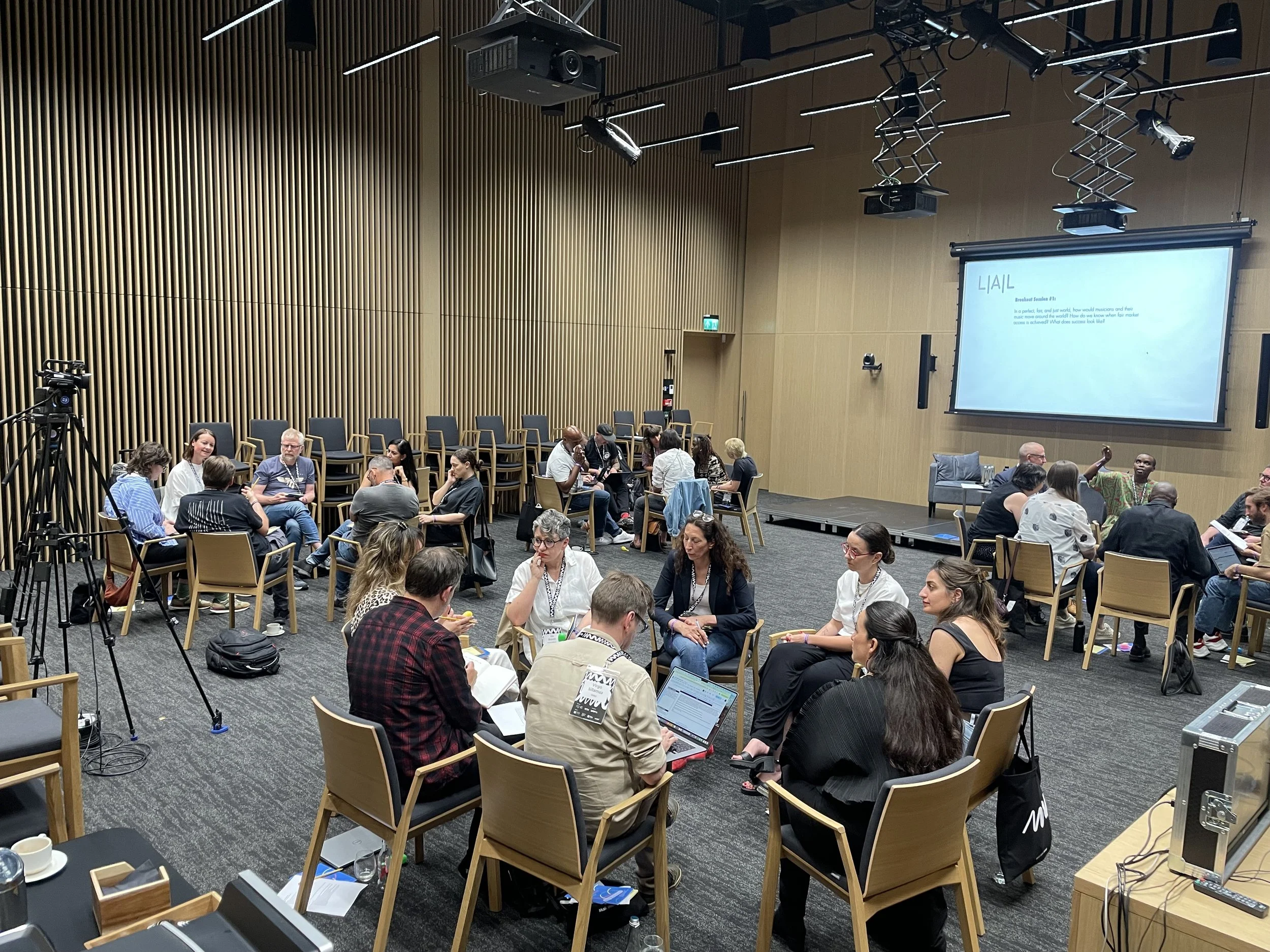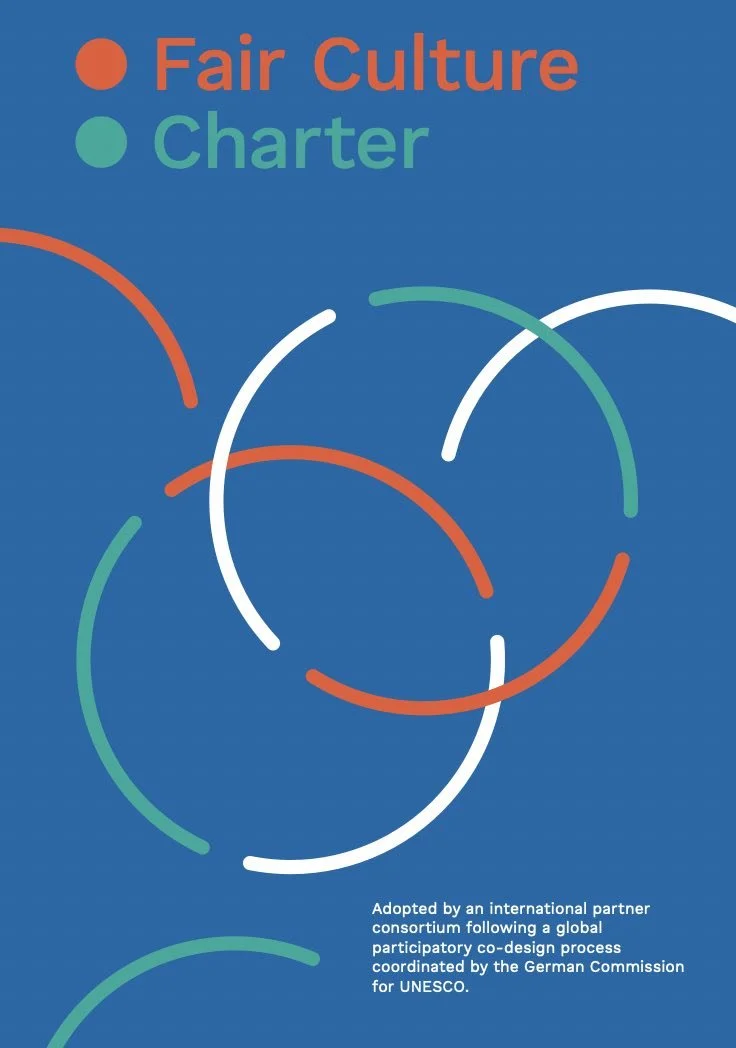L|A|L.1 - Market Access in Music
27 June 2025 at Music Week Poland - Warsaw, Poland
The first edition of Live|Arts|Lab was devoted to exploring ways to promote fairer access to global culture markets with a specific focus in the music industry. We used “Principle #5: Fair Market Access” of the Fair Culture Charter as a starting place, as it is central to the notion of trade and equitable exchanges on a global scale. With a remarkable collection of industry and policy leaders, we set out to discuss five broad questions:
In a perfect, fair, and just world—would musicians and their music move around the world? How do we know when fair market access is achieved? What does success look like?
What can be done to promote fair pay for disadvantaged artists along local, regional, and global cultural value chains?
What can be done to increase the value of diverse cultural expressions in advantaged communities?
What can be done to promote non-discrimination and gender equality along local, regional, and global cultural value chains?
What can be done to promote the development of the cultural sectors in disadvantaged communities?
Fellows L|A|L.1
The L|A|L.1 Fellows were:
Sally Abu Bakr (Palestine), Marlon Burton (United Kingdom), Ula Buyuly (Poland), Paty Carrera (Mexico / Spain), Rachel Cartier (France), Rosana Corbacho (Spain), Joe Frankland (United Kingdom), Mila Georgieva (Bulgaria), Aysha Hussain (United Kingdom / Germany), Justyna Jochym (Poland / Australia), Karolina Juzwa (Poland), Tamara Kamińska (Poland), Frank Kimenai (Netherlands / Belgium), Jaanika Lillemaa (Estonia), Neus López (Spain / Germany), Ondiso Madete (Kenya / Finland), Darek Mazzone (Poland / United States of America), Dr. Lutz Möller (Germany), Luiza Moroz (Ukraine / Belgium), Dr. Keith Nurse (Trinidad and Tobago), Emma Mbeke Nzioka / Coco Em (Kenya), Erica Romero Pender (Spain), Sophia Sagaradze (Georgia / Denmark), Anupama Sekhar (India / United Arab Emirates), Dev Sherlock (United States of America), Helen Sildna (Estonia), Virgo Sillamaa (Estonia / Belgium), Michaël Spanu (France / Mexico), Franziska Stambke (Germany / Belgium), Jarek Szubrycht (Poland), and Balázs Weyer (Hungary).
Outcomes of L|A|L.1
The Lab’s fellows reiterated numerous concerns frequently voiced by industry professionals, cultural workers, artists, and policy experts, regarding promoting fair global market access through:
simpler, more affordable, and more reliable visa and tax protocols to facilitate international tourings, especially for artists from Global Majority countries,
stronger protections for artists and industry regarding freedom of artistic expression,
fairer remuneration for artists and arts workers, through stronger civil society advocacy on topics of cultural rights, especially regarding artists rights to revenue in streaming and A.I. applications,
more sophisticated integration between local, federal, and international cultural policy, especially regarding implementation of policies promoting preferential treatment of cultural production from disadvantaged communities,
corporate best practices that prioritize long term investments in artistic development of individual artists, creative communities, and emerging markets, with special focus on underrepresented or disadvantaged artists, creative communities, or markets,
education of audiences and citizens, designed to promote interest in cultural diversity,
mentoring from artists and cultural workers to policy makers, and other cultural leaders, and
fairer access to technology in underserved communities and regions, which impacts the physical access to market.
Broadly, however, the most innovative discourse during the Lab occurred where policy and industry professionals leveraged the opportunity to explore collaborative solutions. Globally, the culture industry, the civil society, and the culture policy sector are often adversarial, or at least treat each other with significant distrust. The L|A|L @ Music Week Poland was a remarkable experience for its participants primarily to the extent that industry leaders, advocates, and policy makers had a chance to explore the synchronicities of their goals, and begin conversations that envisioned the possibility of mutually beneficial policies and practices that would better serve the interests of fairness. And in this capacity, there was broad agreement of the important role of fora like Live|Arts|Lab.
Hosts, Advisors, Collaborators
The first edition of Live|Arts|Lab took place at the Polish History Museum of Warsaw in the framework of Music Week Poland 2025. Music Week Poland was born out of ambition, aspiration and need but also out of the great potential of Poland’s music scene. This showcase festival and conference aims to be a gateway for Polish and Eastern European artists to enter the dynamic and ever-expanding European music markets. At the same time, it wishes to serve as a meeting point where professionals and artists have the chance to converge and connect in a safe, open-minded, and encouraging environment. In the global conversation about music, Music Week Poland plans to amplify voices from local scenes, and search for regional prospects, undertones, experiences - which made it the perfect host and partner for the first edition of Live|Arts|Lab.
Content for this edition of the Live|Arts|Lab was developed on the basis of conversations with Dr. Lutz Möller from the German Commission for UNESCO as well as his team, and with Anupama Sekhar. We wish to thank them profusely for their support in shaping this first edition.
L|A|L.1 was recognised as a Pre-Conference Side Events as part of the Extended Programme towards MONDIACULT 2025. MONDIACULT is the world’s biggest cultural policy conference, organised under the auspices of UNESCO. The 2025 edition brought together thousands of participants to set the global agenda for culture in the years ahead.
Fair Culture Charter Principle in Focus
During L|A|L.1, we dived into Principle #5 of the Fair Culture Charter: Market Access. The text below reproduces the description of this principle in the Charter itself:
Diverse cultural expressions of all artists, creatives and other cultural workers should enjoy equal access to local, national and global markets, including in the digital environment. The promotion of cultural exchanges should always enrich national and local content and should never come at the expense of the discoverability of such content. When enabling market access, particular attention should be given to women as well as to artists, creatives and other cultural workers belonging to marginalized groups, minorities, and under-represented communities. Indigenous peoples require particular attention, as do afro-descendant communities.
Preferential treatment to cultural expressions that are under-represented in the market and in particular in international exchanges is an obligation to be strengthened through appropriate and efficient mechanisms, including new ones. Such mechanisms are also needed to facilitate and support the mobility of artists, creatives and other cultural workers. These include provisions such as specific needs-sensitive visas, working permits, fair tax treaties, streamlined customs procedures, information resources in local and national languages, and access to cultural and educational infrastructure, such as artists’ residencies, arts festivals, international fairs, and exchange programs.
States should refrain from entering trade commitments that might compromise their ability to adopt and implement cultural policies aimed at protecting and promoting the diversity of cultural expressions on their territory and in the digital environment. To this end, the inclusion of a cultural exception or exemption in trade agreements to protect these interests is highly recommended.
Find the full content of the Charter here.




